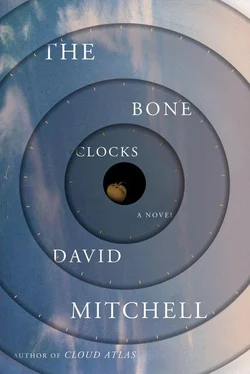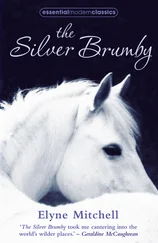“You’re not wrong.” Aoife fans herself with her cap. “That’s why Australia and New Zealand’re, like, invasion-proof. Any foreign army’d only get halfway up the beach before the time difference’d kick in, and they’d just like whoa , and col lapse in the sand and that’d be it, invasion over. Sorry we missed your event earlier.”
I think of Aphra Booth. “Don’t be. So,” this is to her mother, “you’re appearing at the Writers Festival too?”
Holly Sykes nods, sipping from a bottle of water. “Aoife’s doing a sort of gap year in Sydney, so this trip tied in nicely.”
“My flatmate in Sydney’s from Perth,” adds Aoife, “and she’s always saying, ‘If you go to Perth, you got to go to Rotto.’ ”
Teenagers make me feel so sodding old. “ ‘Rotto’?”
“Here. Rotto is Rottnest Island. Fremantle’s ‘Freo’; ‘afternoon’ is ‘arvo.’ Isn’t it cool how Australians do that?”
No , I’d ordinarily reply, it’s baby talk for grown-ups . But, then, whither humanity sans youth? Whither language sans neologisms? We’d all be Struldbrugs speaking Chaucerian.
“Fancy a fresh apricot?” Aoife offers me a brown paper bag.
MY TONGUE CRUSHES another perfumed fruit against the roof of my mouth. I throw away the apricot stones, thinking of Jack’s mother throwing away the beans that’ll turn into the beanstalk in the morning. “Ripe apricots taste exactly of their color.”
“You talk like a real writer, Crispin,” says Aoife. “My uncle Brendan’s always teasing Mum, saying now she’s this famous author she ought to talk posher, not all, ‘Watch yer bleedin’ marf or I’ll clock yer one, innit.’ ”
Holly Sykes protests, “I do not talk like that!”
I miss Juno and Anaïs teasing me. “So what’s this ‘sort of’ gap year of yours about then, Aoife?”
“I’ll be studying archaeology at Manchester from September, but Mum’s Australian editor knows a professor of archaeology at Sydney, so this semester I’m sitting in on the lectures in return for helping with a project at Parramatta. There was a factory there for convict women. It’s been amazing, piecing their lives together.”
“Sounds worthy,” I tell Aoife. “Is your dad an archaeologist?”
“Dad was a journalist, actually. A foreign correspondent.”
“What does he”—too late I spot the “was”—“do now?”
“Unfortunately a missile hit his hotel. In Homs, in Syria.”
I nod. “Excuse my tactlessness. Both of you.”
“It’s eight years ago,” Holly Sykes reassures me, “and …”
“… and I’m lucky,” now Aoife reassures me, “ ’cause there’s, like, a gazillion interviews with Dad on YouTube, so I can go online and there he is, chattering away, large as life. Next best thing to hanging out.”
My dad’s on YouTube too, but I find watching him makes him deader than ever. I ask Aoife, “What was his name, your dad?”
“Ed Brubeck. I’ve got his name, too. Aoife Brubeck.”
“Not the Ed Brubeck? Wrote for Spyglass magazine?”
“That’s him,” says Holly Sykes. “Did you know Ed’s writing?”
“We met! When was it? Washington, about 2002? My former wife’s brother-in-law was on the panel for the Sheehan-Dower Prize. They awarded it to Ed that year, and I’d done a reading in town that day, so we shared a table at dinner that evening.”
Aoife asks, “What did you and Dad talk about?”
“Oh, a hundred things. His job. 9/11. Fear. Politics. The pram in the writer’s hallway. He had a four-year-old back in London, I recall.” Aoife smiles with her whole wide face. “I was working on a journalist character, so Ed let me quiz him. Then we emailed from time to time, after that. When I heard the news, about Syria …” I exhale. “My very belated condolences, to both of you. For whatever they’re worth. He was a bloody good journalist.”
“Thank you,” says one; and “Thanks,” the other.
We gaze out across eleven miles of ferry-plowed sea.
Perth’s dark skyscrapers stand against the light sky.
Twenty paces away, a medium-sized mammal I cannot identify lollops out of the scrub and down the slope. Chubby as a wallaby, reddish-brown, kangaroo forepaws, and a foxy wombat face. A tongue like a finger slurps the apricot stones. “Good God. What is that ?”
“That charming devil is a quokka,” says Aoife.
“What’s a quokka? Besides a hell of a Scrabble score.”
“An endangered marsupial. The first Dutch who landed here thought they were giant rats, so they called the place Rat’s Nest Island: Rottnest, in Dutch. Most mainland quokkas got killed by dogs and rats, but they’ve managed to survive here.”
“If the archaeology falls through, there’s always natural history.”
Aoife smiles. “I Wikipediaed them five minutes ago.”
I ask, “Reckon they like apricots? There’s a squishy one left.”
Holly looks dubious. “What about ‘Do Not Feed the Animals’?”
“It’s not like we’re chucking them Cherry Ripe bars, Mum.”
“And surely,” I add, “if they’re endangered, they’ll need all the Vitamin C they can get.” I lob the apricot to within a few feet of the animal. It waddles over, sniffs, chomps, and looks up at us.
“ ‘Please, sir,’ ” Aoife does a trembly Oliver Twist voice, “ ‘can I have some more?’ How cute is that? I’ve got to take a photo.”
“Not too close, love,” says her mother. “It’s a wild animal.”
“Gotcha.” Aoife walks down the slope, holding out her phone.
“What a well-raised kid,” I tell her mother, in a low voice.
She looks at me, and I see the signs of a full, fraught life around her eyes. If only she hadn’t written a book full of angel bollocks for gullible women disappointed with their lives, we could be friends. It’s a fair guess that Holly Sykes knows about my daughters and my divorce: the ex — Wild Child of British Letters may not be famous enough to sell books, but Zoë’s huge “I Will Survive” splash for the Sunday Telegraph gave the world a very one-sided version of our troubles. We watch Aoife feed the quokka, while all around us Rottnest’s bleached slopes buzz and whistle with insects, tinnitus-like. A lizard crosses the dust and …
The feeling of being watched comes back, stronger than ever. We aren’t the only ones here. There are lots. Near. I could swear.
Acacia tree to wiry shrub to shed-sized rock … Nobody.
“Do you feel them too?” Holly Sykes is watching me. “It’s an echo chamber, this place …”
If I say yes to this, I say yes to her whole flaky, nonempirical world. By saying yes to this, how do I refuse crystal healing, pastlife therapy, Atlantis, Reiki, and homeopathy? The problem is, she’s right. I do feel them. This place is … What’s another word for “haunted,” Mr. Novelist? My throat’s dry. My water bottle’s empty.
Down on the rocks blue breakers flume on rocks. I hear the boom, faint and soft, a second later. Further out, surfers at play.
“They were brought here in chains,” says Holly Sykes.
“Who were?”
“The Noongar. Wadjemup, they called this island. Means the Place Across the Water.” She sniffs. “For the Noongar, the land couldn’t be owned. No more than the seasons could be owned, or a year. What the land gave, you shared.”
Holly Sykes’s voice is flattening out and faltering, as if she’s not speaking but translating a knotty text. Or picking one voice out from a roaring crowd. “The djanga came. We thought they were dead ones, come back. They forgot how to speak when they were dead, so now they spoke like birds. Only a few came, at first. Their canoes were big as hills, but hollow, like big floating rooms made of many many rooms. Then more ships, more and more, every ship it puked up more, more, more of them. They planted fences, waved maps, brought sheep, mined for metals. They shot our animals, but if we killed their animals, they hunted us like vermin, and took the women away …”
Читать дальше












